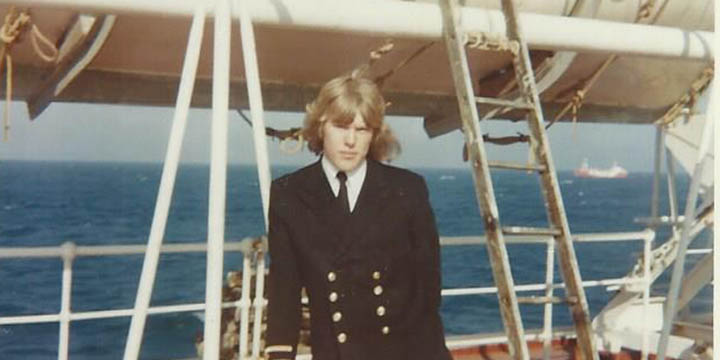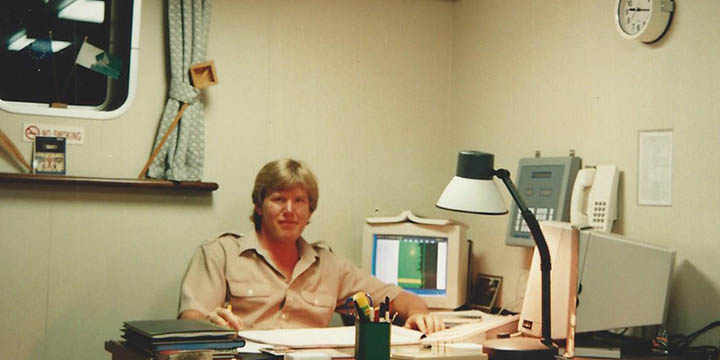- Topics
- Campaigning
- Careers
- Colleges
- Community
- Education and training
- Environment
- Equality
- Federation
- General secretary message
- Government
- Health and safety
- History
- Industrial
- International
- Law
- Members at work
- Nautilus news
- Nautilus partnerships
- Netherlands
- Open days
- Opinion
- Organising
- Switzerland
- Technology
- Ukraine
- United Kingdom
- Welfare
50 years a seafarer – the ups and downs of staying at sea for an entire career
17 September 2019

There's been a lot of talk recently about the shore-based opportunities for seafarers who have had enough of the oceans. But what if you love the sea and want to spend your whole career there? Can you have a successful home life? Sarah Robinson meets a Nautilus member who has made it work
Once Barrie Shaw has set eyes on something that needs fixing, there’s no stopping him, at home or onboard ship. And it’s this passion that has kept the chief engineer at sea to this day – five decades after he began his Merchant Navy cadetship.
Back in the 1960s, young Barrie had always been interested in boats, and decided on a career at sea at the age of 13 or 14. 'I thought about the Navy, but my father said I was too awkward to take orders,' he smiles.
Luckily, there turned out to be another way to become a ship’s engineer, as Barrie discovered from a career convention organised by his school: 'I was having a chat with the Royal Navy guys when I spotted another stand with a man in uniform, so I thought I’d go and see what he did.' Growing up inland in Cheshire, Barrie had never seen a big ship, but the Merchant Navy representative explained how merchant vessels bring us all of our goods, and the schoolboy was soon hooked.
'I asked him which type of ship paid the best, and he said tankers, so that’s what I chose,' Barrie recalls. 'He told me how to find an engineering cadetship, and when I came to apply in 1969, shipping companies were clamouring for cadets and I got a job with Shell.'
Two years of marine engineering studies followed at Riversdale Technical College in Liverpool, and then Barrie embarked on a sea phase with the Methane Princess, the world’s first gas tanker. 'Everyone told me what an honour it was to be onboard, and asked if my father was something special for me to have got the job. They said the living conditions were fantastic, but they only seemed OK to me. I didn’t get it until I later had to go on the heavy oil tankers Valvata and Achatina, which had cockroaches everywhere.'

Rather disappointed with his experience of tankers – particularly as he had been unable to go ashore much during his voyages with Shell – Barrie decided to make a change when he finished his training. 'People back at college were telling me what a great time they’d had on general cargoships, so I looked through the list of employers and got a job with Ellerman’s. They turned out to be a brilliant company, and I worked my way up from fourth engineer to second engineer with them.'
By the late 1970s, the halcyon days of the British Merchant Navy were over, and Ellerman City Liners was one of the companies forced to close. Barrie managed to get a chief engineer’s post on containerships with Bell Line in 1980. 'When I started with Bell, I was only 27 and must have been the youngest chief engineer in the country,' he said. 'I didn’t even have my chief’s ticket at that point, but that was OK because they were coastal. I talked myself into the job because they needed someone urgently and I’ve always been full of confidence.'
These days, new people often struggle. But I don’t get rid of them, I train them
Barrie was still with Bell Line when the company went out of business in 1997. 'Was it something to do with me, all these companies going bust?' he laughs. Whatever the reason for Bell’s particular misfortunes, the chief engineer found himself out of a job in a difficult economic climate. 'I’d been used to a good social life onboard and port visits around the Med, but I had to try other things,' he says a little sadly.
With the days of long spells with individual companies seemingly behind him, the next 15 years saw Barrie serving on a cable ship, a dive support vessel, a cross-channel sea cat, a cross-channel ro-ro and on car carriers.

Between 2002 and 2012, he was able to stay for longer periods with UECC car carriers and Meridian ro-pax vessels, but the Curse of Barrie Shaw eventually struck again and both companies laid him off due to loss of business.
At that point, Barrie found himself with no choice but to go where the work was – the offshore industry – and he serves on Havila platform supply vessels to this day. It wasn’t something he’d ever aspired to. 'I still love the job, but I have to admit that the North Sea can a bit boring because you never go anywhere interesting,' he says.
Barrie enjoys passing on his knowledge to junior engineers and feels that this onboard teaching role enriches his work, but he is scathing about Britain's maritime education system. 'I think the training's diabolical now. They come out of college with a piece of paper but aren’t ready to be third engineer. Everyone knew this in the past, and when I started as a fourth engineer, I had a lot of supervision.
'These days, new people often struggle, and some of the crew say, oh he’s useless, he doesn’t know anything. But I don’t get rid of them, I train them – even standing in front of a whiteboard sometimes. And I get them dismantling things and putting them back together, which it seems they’re not allowed to do in the sea phases of their cadetships.'
Barrie was also on hand to guide his own sons Craig and Daniel when they were growing up – perhaps surprisingly for someone who has worked for so long at sea. 'I’ve done one month on, one month off for most of my career,' he explains, so I was at home a lot, really.'
Barrie’s wife Helen says she's been happy with this arrangement too, as it’s something they established right from the beginning of married life. 'It works because it’s all we’ve known,' she points out. 'Of course there was the odd time when things went wrong and it was difficult with Barrie being away, but mostly I’m confident in managing things by myself.'
The couple met just after Barrie had passed his first seafaring exams, when he took his parents out for a celebratory dinner at a restaurant where Helen was working. Her own talents have enabled her to do a variety of flexible work over the years – from fashion modelling through to being a hairdresser and a receptionist.
When Barrie is home from the sea, he and Helen have an agreement that he won't upset the domestic routine, but he is welcome to build and mend things around the house and garden. 'I look forward to things breaking so I can fix them,' he laughs. He also enjoys maintaining his precious Jaguar XKR convertible, which has taken him and Helen on two wonderful tours around Europe already – with more in the pipeline for retirement.
Ah yes, retirement. Barrie says he’s carried on for so long at sea because if he's fit and enjoys the job, why not? 'I guess I never seriously considered coming ashore as I had so much job satisfaction solving problems at sea.'
But at the age of 67, it does now look like he's finally going to swallow the anchor, and Helen is bracing herself for the unfamiliar experience of having him at home full time. 'Barrie’s never happier than when he’s in a boiler suit with a spanner in his hand, so I expect he’ll find plenty of DIY to do,' she says. 'But if the worst comes to the worst, I’ll come out of retirement and get a job away from the house myself!'
Tags
